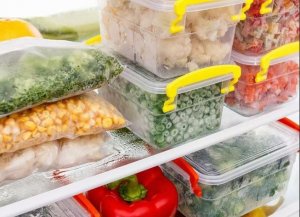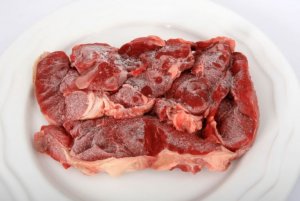Foods You Can Freeze

People have been freezing their food since ancient times. They used to do this with ice sheets; today the process has moved on and we now use freezers that we have in our homes.
Freezing food helps to preserve its nutrients and properties, because microorganisms cannot grow in cold temperatures.
The best temperature to freeze foods is, 0 degrees Fahrenheit. This temperature guarantees that food won’t deteriorate, since the pathogens responsible for the decomposition of matter, remain in a state of dormancy -an inactive state- in such cold environments. This allows the preservation of almost all of the properties in food.
On the other hand, it’s important to remember that freezing food you’ve already defrosted, isn’t good, as it may lose many of its properties during the process. Here’s a useful list of foods that you can freeze.
Foods that you can freeze

We’re going to talk about the foods that you may think will lose their composition if you freeze them, but you can actually freeze them without any problems.
- Eggs: even though people think that they can’t freeze eggs, that’s not true. But you have to follow a certain procedure before freezing them. To freeze eggs, you must remove the shell. Put them in a container that you can place in the freezer and beat them so that the yolk and the egg-white mix together. Sometimes it’s advisable to freeze the yolks and the whites separately, but this isn’t completely necessary.
- Chocolate: to freeze chocolate, you must let it cool in the fridge for a few hours beforehand. If you don’t do this, it may lose its texture and flavor.
- Milk: if you freeze milk, its appearance and texture will change, because the fat separates from the whey. But this doesn’t mean that you can’t drink the milk after freezing it, since once defrosted, it recovers its original consistency. Milk with a low fat percentage is better for freezing.
- Meat and fish: the only point that you must remember, is that once you defrost meat, you can’t freeze it again. After defrosting you can keep it in the fridge for a maximum of three days.
- Vegetables: You can chop these up and store them in freezer bags.

- Bread: freezing bread is an easy process. It’s a very common food to freeze, because it retains its properties at room temperature for a very short time.
- Flour: to keep flour from spoiling, you can store it in a container and put it into the freezer without any problems.
- Butter: even though butter is a fat, you can put this in the freezer.
- Pasta and rice: you can freeze both foods, as long as they’re cooked. The only issue is that sometimes their texture isn’t exactly the same as when you cook them fresh; however, their taste and nutritional values remain intact.
- Fresh fruits: one of the easiest foods to freeze. It’s also a great choice to make sorbets and ice creams with, for summer, and they’re very healthy.
* Frozen food can help you to eat a healthier and more balanced diet, because even if you’re in a hurry, you can freeze individual portions in containers, and simply defrost them each day or as you need them.
Freeze your food safely
- Store each type of food in different bags or containers, don’t mix them together.
- Know what foods require a previous process, so that you can freeze them properly.
- Avoid freezing any food that’s already been defrosted.
- The recommended containers for freezing are plastic containers.
- Defrost the food gradually and put it into the fridge, so that its temperature goes down little by little.
People have been freezing their food since ancient times. They used to do this with ice sheets; today the process has moved on and we now use freezers that we have in our homes.
Freezing food helps to preserve its nutrients and properties, because microorganisms cannot grow in cold temperatures.
The best temperature to freeze foods is, 0 degrees Fahrenheit. This temperature guarantees that food won’t deteriorate, since the pathogens responsible for the decomposition of matter, remain in a state of dormancy -an inactive state- in such cold environments. This allows the preservation of almost all of the properties in food.
On the other hand, it’s important to remember that freezing food you’ve already defrosted, isn’t good, as it may lose many of its properties during the process. Here’s a useful list of foods that you can freeze.
Foods that you can freeze

We’re going to talk about the foods that you may think will lose their composition if you freeze them, but you can actually freeze them without any problems.
- Eggs: even though people think that they can’t freeze eggs, that’s not true. But you have to follow a certain procedure before freezing them. To freeze eggs, you must remove the shell. Put them in a container that you can place in the freezer and beat them so that the yolk and the egg-white mix together. Sometimes it’s advisable to freeze the yolks and the whites separately, but this isn’t completely necessary.
- Chocolate: to freeze chocolate, you must let it cool in the fridge for a few hours beforehand. If you don’t do this, it may lose its texture and flavor.
- Milk: if you freeze milk, its appearance and texture will change, because the fat separates from the whey. But this doesn’t mean that you can’t drink the milk after freezing it, since once defrosted, it recovers its original consistency. Milk with a low fat percentage is better for freezing.
- Meat and fish: the only point that you must remember, is that once you defrost meat, you can’t freeze it again. After defrosting you can keep it in the fridge for a maximum of three days.
- Vegetables: You can chop these up and store them in freezer bags.

- Bread: freezing bread is an easy process. It’s a very common food to freeze, because it retains its properties at room temperature for a very short time.
- Flour: to keep flour from spoiling, you can store it in a container and put it into the freezer without any problems.
- Butter: even though butter is a fat, you can put this in the freezer.
- Pasta and rice: you can freeze both foods, as long as they’re cooked. The only issue is that sometimes their texture isn’t exactly the same as when you cook them fresh; however, their taste and nutritional values remain intact.
- Fresh fruits: one of the easiest foods to freeze. It’s also a great choice to make sorbets and ice creams with, for summer, and they’re very healthy.
* Frozen food can help you to eat a healthier and more balanced diet, because even if you’re in a hurry, you can freeze individual portions in containers, and simply defrost them each day or as you need them.
Freeze your food safely
- Store each type of food in different bags or containers, don’t mix them together.
- Know what foods require a previous process, so that you can freeze them properly.
- Avoid freezing any food that’s already been defrosted.
- The recommended containers for freezing are plastic containers.
- Defrost the food gradually and put it into the fridge, so that its temperature goes down little by little.
All cited sources were thoroughly reviewed by our team to ensure their quality, reliability, currency, and validity. The bibliography of this article was considered reliable and of academic or scientific accuracy.
- Adrià, F. (2021). La comida de la familia. Rba Libros.
- La casa de los electrodomésticos. (2022). Consejos para congelar tus alimentos. https://www.lacasadelelectrodomestico.com/blog/consejos-congelar-alimentos/#:~:text=Temperatura%20de%20congelaci%C3%B3n%20y%20de,para%20congelar%20es%20de%2025%C2%BAC.
- Yu, S., Ma, Y., & Sun, D.-W. (2010). Effects of freezing rates on starch retrogradation and textural properties of cooked rice during storage. Lebensmittel-Wissenschaft Und Technologie [Food Science and Technology], 43(7), 1138–1143. https://doi.org/10.1016/j.lwt.2010.03.004
This text is provided for informational purposes only and does not replace consultation with a professional. If in doubt, consult your specialist.








